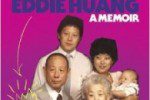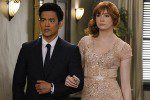What the show does is subvert, re-purpose and claim a once derogatory term as our own. To take the power of an insult and claim it as our own red badge of courage…
 First off, this is a review of the “Fresh Off the Boat” TV series inspired by Eddie Huang’s memoir of the same name. I won’t be commenting on it’s faithfulness to the book (which has already been reviewed here) as the TV series itself is said to be “inspired by” instead of “based on a true story.”
First off, this is a review of the “Fresh Off the Boat” TV series inspired by Eddie Huang’s memoir of the same name. I won’t be commenting on it’s faithfulness to the book (which has already been reviewed here) as the TV series itself is said to be “inspired by” instead of “based on a true story.”
Now to begin with, I want to address the actual name of the show “Fresh Off the Boat” which has created some controversy for it’s perceived insulting pedigree. Now it’s true fresh off the boat, or FOB, has typically been considered an insult. But it’s one that is almost always levied by Asian Americans (who were born in America and highly acclimated to American culture) against their more uncouth, “uncultured” brethren who came straight from the Asian motherland.
Whenever I got called a name in school, it was chink, gook, Jackie Chan, Jet Li, ching chong, small dick, etc. by non-Asians (as actually happens in Episode 1). FOB was something only we Asians called each other.
Nowadays, you see this mostly in the form of mocking, almost bullying, humor in YouTube videos where numerous Asian Americans have gained a huge following numbering in the millions by mocking their fellow Asians by putting on the “yellow face” stereotype of broken English speaking Asian foreigner. Now it’s funny and hilarious even, but it’s also, at least in my view, a form of intercultural bullying. The belief that Americanized Asians are superior to foreign-born Asians.
So what does this have to do with the actual TV show, “Fresh Off the Boat”?
 What the name, and the show, attempts to do is subvert, re-purpose and ultimately claim a once derogatory term as our own. To take the power- and thus the sting- of an insult and claim it as our own red badge of courage whether against mainstream America or against our fellow Asian Americans (who will undoubtedly be flocking to this TV show). Much like the African American community has been able to take the n-word and make it their own and deny (for the most part) the use of that word to others (at least not without consequences).
What the name, and the show, attempts to do is subvert, re-purpose and ultimately claim a once derogatory term as our own. To take the power- and thus the sting- of an insult and claim it as our own red badge of courage whether against mainstream America or against our fellow Asian Americans (who will undoubtedly be flocking to this TV show). Much like the African American community has been able to take the n-word and make it their own and deny (for the most part) the use of that word to others (at least not without consequences).
The last time America even attempted a full Asian American TV show was 20 years ago with Margaret Cho’s failed “All American Girl” which depended heavily on hackneyed stereotypes and more about Asians being laughed at, instead of with.
 But as Jeff Yang (Wall Street Journal writer and father of Hudson Yang who plays Eddie Huang on “Fresh Off The Boat” and who had originally criticized Cho’s show) said recently, he didn’t realize that Asian Americans would spend the next 20 years wondering the TV desert before we would get our next shot at a primetime TV show. The closest we’ve had since then was John Cho’s romantic leading man status in ABC’s “Selfie”, which was also cancelled.
But as Jeff Yang (Wall Street Journal writer and father of Hudson Yang who plays Eddie Huang on “Fresh Off The Boat” and who had originally criticized Cho’s show) said recently, he didn’t realize that Asian Americans would spend the next 20 years wondering the TV desert before we would get our next shot at a primetime TV show. The closest we’ve had since then was John Cho’s romantic leading man status in ABC’s “Selfie”, which was also cancelled.
We haven’t had any significant presence in the media which ultimately plays a small, but pivotal role, in who we choose to model ourselves after when growing up.
So does this Asian American show succeed? Is it a watershed moment in American, or more specifically Asian American, history?
Is this the Asian American TV show that America deserves?

Yes, yes it is.
Tonight ABC aired both Episode 1: “Pilot” and Episode 2: “Home Sweet Home-School”.
Ultimately the title “Fresh Off the Boat” serves as a stand-in for the real racial pejoratives that Asians encounter in the Western word.
In the first episode, our young protagonist Eddie is called “chink.”
I don’t know if it’s the first time primetime television has ever used the term “chink”, but I do know it’s the first time that I’ve seen in recent memory a positive and uplifting reaction by an Asian acting on his own agency. Namely the young Eddie, who serves as a stand-in for the rest of us Asian American males who grew up during the 80s and 90s, actually standing up for himself against the racist (“He kicked him in the groinal area”). But more than that, his parents do too (“We’re upset that you didn’t do anything about him calling our son a chink” or “You do your best not to make waves, but I will never be upset at you for standing up for yourself“).
Too often we’re taught to bow down and take the shellacking as part of the model, and silent, minority. But here we’re witness to a scene that does anything but that.
But beyond all the racial politics, the show itself is funny. It’s funny as in we’re laughing with the Asian family funny. We, at long last, are not the actual butt of the jokes, but rather the instigator of the humor.
Nominally Hudson Yang is the titular character Eddie Huang, but it’s Constance Wu who plays his mother, Jessica Huang the original Tiger Mom, that is the breakout character and steals most of the scenes she’s in.
Constance has some of the best one-liners, zingers, and laugh out loud moments (“Evan’s body is rejecting white people culture. Which makes me kind of proud.” “If we get lost, try and join a white family. You will be safe there.”)
Much like we saw in Margaret Cho’s stand up comic skit where she lovingly mocks her mom’s accent, it’s done in such a way that it humanizes Mama Cho’s outlandish and over-the-top foreign characteristics while at the same time making her a hilarious, and lovable, character.
Constance’s Jessica Huang is less a caricature of an Asian tiger mom and more the tough, loving mom we wished (and feared at the same time) we could have.

It has tiny touches of authenticity like the Asian bowls the kids ate from at the dinner table and Asian cram schools (like the CLC or Chinese Learning Centre). There are vibes of “Fresh Prince of Bel Air” injected with African American nuances via the lone black kid in school and the recognition of hip-hop as the magnet for resistance to mainstream culture.
Ultimately, this is a Trojan horse show. It sells the sizzle of humor from the “fish out of water” angle like “Fresh Prince of Bel Air”, but also injects something new and colorful into the lexicon of American culture while subverting what Americans think of Asians: whether it’s the hip-hop, black culture inspired Eddie or Emery (Forrest Wheeler) getting a white girlfriend on the first day of school.
Will “Fresh Off the Boat” and it’s creator Nahnatchka Khan (creator of “Don’t Trust the B—- in Apartment 23”) stick? Is diversity, humor and breakout actors enough to garner the ratings required to be renewed for a second season? Or will it suffer the same ignominious fate as “Selfie”, that of being relegated to Hulu after being cancelled even before the end of Season 1.
It definitely deserves it’s moment in the sun and a shot at a future if the first two episodes, and it’s stellar cast, are anything to judge by.
Future episodes of “Fresh Off the Boat” will air on Tuesdays, 8/7c, on ABC.
